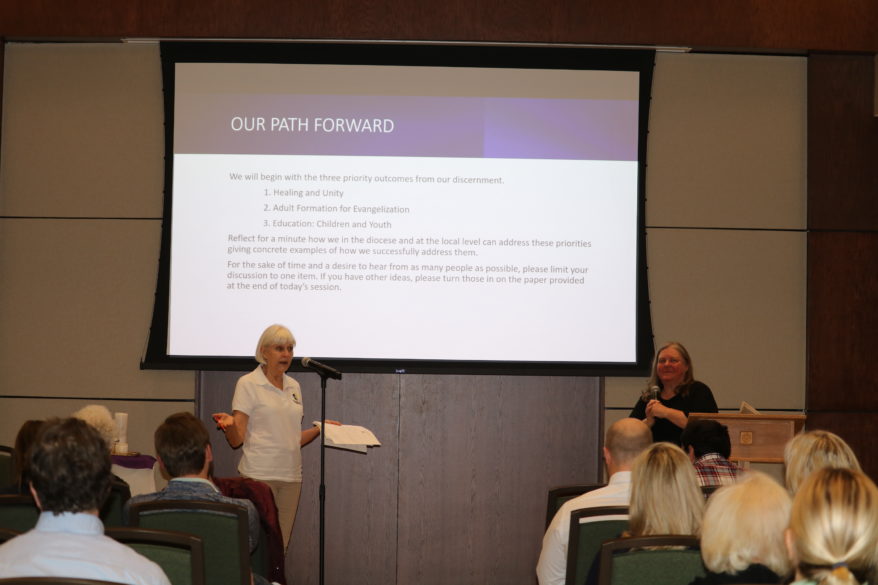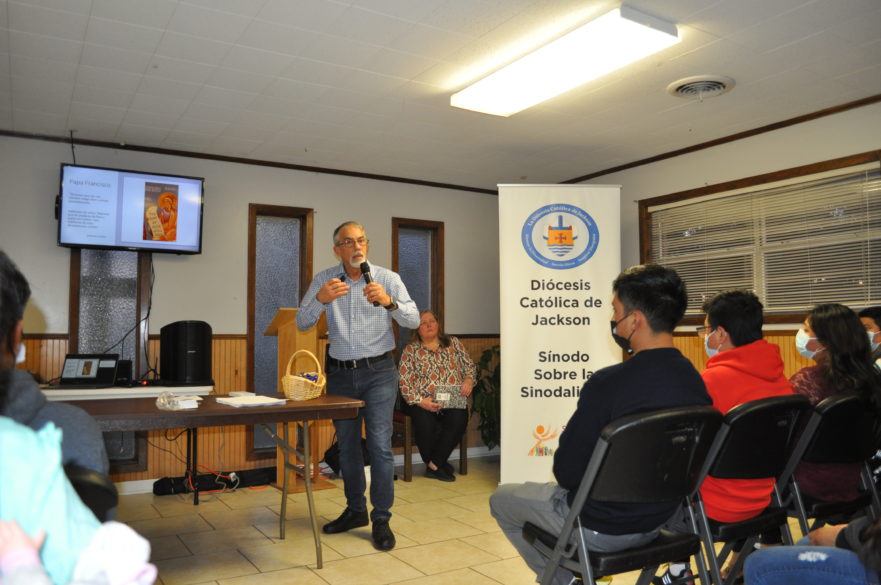By Joanna Puddister King and Berta Mexidor
JACKSON – Catholics around the diocese shared their hopes for the church with Bishop Joseph Kopacz and members of the Synod Advisory Council at regional listening sessions held around the diocese over the past five weeks.
A total of ten sessions were held from March 21 through April 19, with two sessions delayed due to bouts of severe weather around the state. These regional sessions were the next step after parishes across the diocese conducted individual listening sessions to hear from people who fill the pews and those who no longer feel connected to the church. From the individual sessions the Synod Advisory Council reviewed every submission from each parish that participated and identified core issues on the minds of those across the diocese.

During the regional sessions, Fran Lavelle, director of faith formation for the diocese and chair of the Synod Advisory Council reviewed the things that were heard in the synod listening sessions. These included the need to create community outreach opportunities, both within the church and the larger community; a need for healing with regard to marriages, annulments, LGBTQ, Racial and ethnic divisions and the sexual abuse scandal; a need for unity; a way to be inclusive of all cultures and diverse communities; increased formation and education of lay leaders; increased faith formation opportunities for adults; the need for more evangelization efforts; ways to reach the young church; among others.
In each regional session, Lavelle went over the above results and said, “what we really want to do is focus on those areas that came up that we can address within the structure of the diocese.”
Those focus areas are healing and unity; adult formation for evangelization, and education of youth. Those who participated were asked to reflect on how the diocese and at a local church level could address the focus areas, giving concrete examples on how to address them.
Many comments around the diocese related to the faith formation of adults, with several pointing to the 2019 Pew Research student that approximately 70% of Catholics believe that the bread and wine used in Communion are only symbolic and not in the church’s teaching of transubstantiation, where the bread and wine actually become the Body and Blood of Jesus.
Fran Patterson of St. Francis Madison said she felt a call and a need that the church “needs to explain to everyone why we do what we do – why we believe it,” referring to the study. She suggested engaging programs like Father Burke Masters, “Be Formed” program. Patterson said that she and others at St. Francis have completed two 90-day series and that the series is “profound.”
“Both some of us as converts, and others as cradle Catholics, we were blown away,” said Patterson. “The richness that is now coming from us actively participating in Mass is profound and we have a desire to do more.”
Along the lines of education, many at the regional sessions focused on youth and how to get them excited about their faith and how to encourage them to be comfortable sharing their faith.
Cecilia Carlton of St. Paul Flowood said that youth at her parish were asking for more instruction on the Bible.
“They are afraid to evangelize because they don’t think they know the Bible like they should.”
Carlton suggested developing another program more Scripture specific, like Catechesis of the Good Shepherd and how to evangelize with Scripture.
The Hispanic community at St. Michael Forest, also echoed Carlton’s suggestion, asking for more faith education and classes on the scripture.
At the regional session at Immaculate Heart of Mary Greenwood, Irene Stark of St. Peter Grenada had an idea to pair youth with senior citizens to learn from each other. “We need something joyful and happy. Something our youth can look forward to doing – like more events and retreats,” said Stark.
Another theme common between English and Spanish speaking communities was the focus of unity and healing. Some present suggested having a more concentrated effort of our parishes holding joint events or sharing events with each other, as “we are one Catholic family,” said one participant.
Glara Martin of St. Francis Greenwood agreed that uniting parishes is a “great way of healing.”
“We need to be willing to learn from each other. We need to feel empowered to reach out to those that have left the church,” said Martin.
“We can’t give up! Even getting one back is enough.”
With the Spanish speaking regional sessions, many of the same concerns with unity were brought up, with regard to the diversity of cultures that exist within the diocese.
At St. Michael Forest, several present spoke about wanting to share traditions and faith within their intercultural community of “Hispanics, Vietnamese, African-Americans and Anglos.”
Deacon Carlos Solá, serving at St. James Tupelo, facilitated the four Spanish regional sessions. He said that people are looking for an experience of faith that will help them in life. “If faith doesn’t help us to live,” said Sola, “what is it for?”

“The church must be that space where brothers and sisters must find the way to live, with intensity and joy, in the style of Jesus: the Way, Truth and Life. In that direction is where our search must go.”
Now that regional synod sessions are complete, the Synod Advisory Council and Bishop Kopacz will compile a 10-page report on what was learned during the sessions. The deadline for filing the report is June 30.
Catholic News Service (CNS) reports that in turn, the reports from all dioceses across the U.S. will be sent to regional gatherings – 16 total. Then, regional representatives will work on drafting individual synthesis reports and submitting them to the United States Conference of Catholic Bishops (USCCB).
The report then enters a “national synthesis phase” according to CNS, then being sent to the Vatican by the end of August for further refinement along with other synod reports from around the globe.
The beauty of the Diocese of Jackson’s process says Lavelle is that by coming together in these regional sessions, “we don’t have to wait for a document from Rome, we can begin to make a difference today.”
